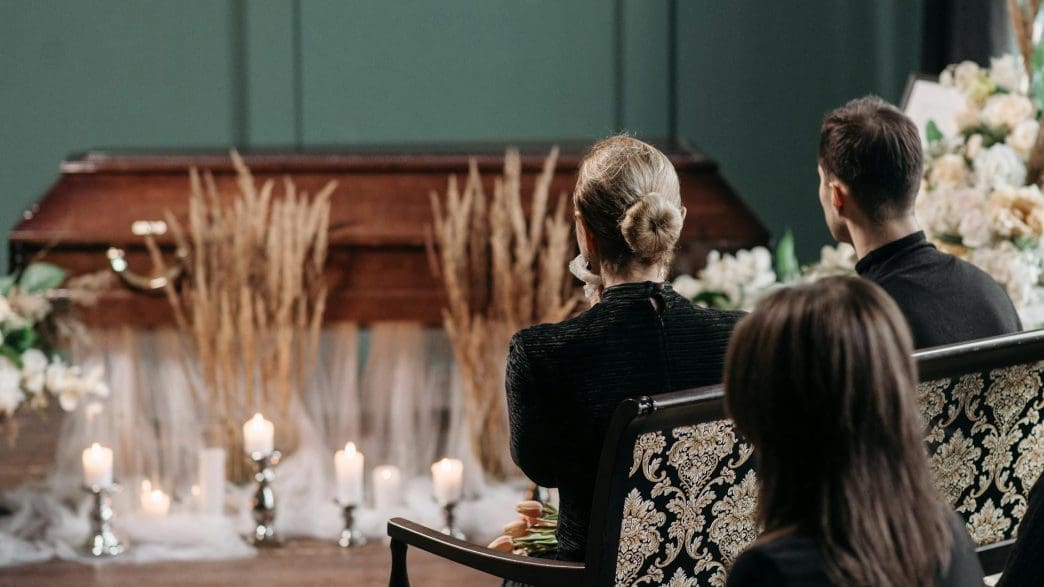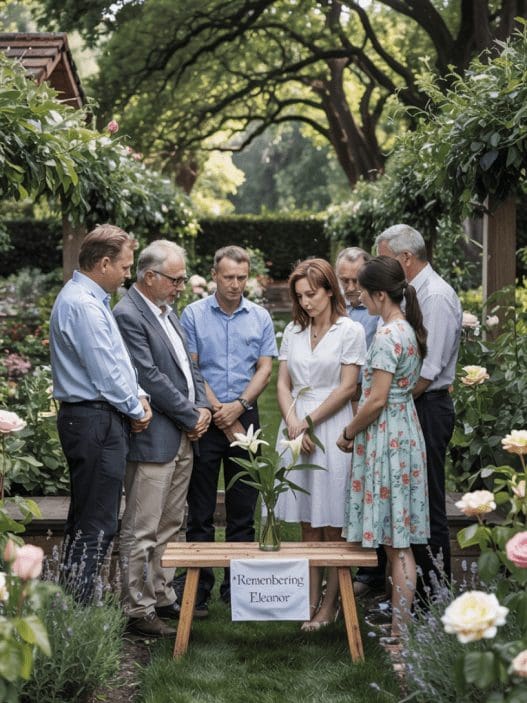When a loved one passes away, the process of planning a funeral can feel overwhelming. Whether you have lost a parent, friend, or child, every detail matters when creating a meaningful and respectful farewell. In this comprehensive guide, we provide a funeral checklist for planning a funeral which covers every aspect of planning a traditional burial.
This guide not only covers the immediate steps, but also dives deep into cultural nuances, emotional support, personalized tributes, and local legal considerations to ensure that every facet of your needs is addressed.
Note: The following guide is designed with a traditional funeral in mind. Depending on your culture and traditions some of the points in the checklist may not be relatable.
Table of Contents
- The first stage of planning a funeral
- Planning the Funeral Service
- Burial Arrangements
- Administrative and Legal Tasks
- Post-Funeral Considerations
- Cultural and Religious Nuances
- Personalization and Custom Tributes
- Local Legal and Administrative Variations
The First Stages of a Funeral Checklist For Planning a Funeral
The moments after a loss are filled with emotional intensity and practical challenges. The following steps outlined in this funeral checklist for planning a funeral are the immediate actions required to handle both the emotional and administrative aspects of a death.
Notifying Authorities and Important Individuals
Medical Personnel
If the death occurs at home, it is essential to have a certified professional confirm the passing and issue a death certificate. In a hospital setting, the staff will guide you through this process. The death certificate is not only a legal requirement but also the foundational document needed to proceed with further arrangements.
Without a death certificate you will not be able to access bank accounts, change documents, cancel insurance policies or change details on government documents etc.
Next of Kin and Close Contacts
Inform immediate family members and close friends as soon as possible. The method of communication might vary depending on your family structure. This could be through phone calls, in-person visits, or via trusted intermediaries. It is important to designate someone who can manage these communications to ensure that accurate information is disseminated and that support is extended to everyone affected.
The sooner people know about the death the sooner they will be able to make travel arrangements ensuring that you do not experience any delays when planning the funeral.
Funeral Director
Contacting a reputable funeral director is crucial. They will help coordinate the arrangements, guide you through each step, and manage many of the logistical aspects of the funeral process. Funeral directors are experienced in dealing with the complexities that arise during these times and can provide invaluable advice on the next steps.
Securing Vital Documents
Death Certificate
The death certificate is crucial for all legal and administrative tasks. Ensure you obtain several certified copies from the issuing authority. These copies will be needed to manage insurance claims, bank accounts, property issues, and other critical affairs.
Will and Testament
Locate the deceased’s will, if one exists, as it will contain important instructions regarding funeral arrangements and the distribution of assets. If no will is found, the estate will be managed under the applicable state laws. Consult with an estate attorney to understand your rights and responsibilities during this process.
Additional Documentation
Keep other essential documents accessible, including:
- Identification Papers: Birth certificate, social security card, and passport.
- Financial Documents: Bank statements, property deeds, and any outstanding bills or obligations.
- Insurance Policies: Life insurance, health, or other policies that may require notification or claims processing.
Funeral Checklist: Planning The Funeral Service
Once the immediate tasks have been managed, focus turns to planning the funeral service. This stage involves many decisions that will shape the farewell and ensure the service is a true reflection of the deceased’s life.
Arranging a Funeral with a Funeral Director
Initial Meeting
Schedule an in-depth meeting with the funeral director. This meeting will provide you with a detailed guide of your options and a planning session for the service. During this time, discuss your vision, budget, and any specific requests that reflect the deceased’s wishes.
The funeral director should help you choose a coffin or urn, transport of the deceased to the funeral home or cemetery, music and location of the funeral.
Detailed Information Gathering
You will need to provide detailed personal information about the deceased, including:
- Full Name, Date of Birth, and Date of Death
- Personal History and Achievements: Important life milestones, personal interests, and significant relationships.
- Preferred Service Type: Any pre-stated preferences regarding religious rites or secular ceremonies.
The funeral director will also inform you about any local regulations or additional requirements that need to be observed.
Organising Funeral Service Details
Service Format
Determine the type of service that best honors the deceased:
- Religious Ceremony: Incorporate religious rituals and prayers, if applicable. Consult with religious leaders to ensure the service is respectful of doctrinal traditions.
- Secular Service: Focuses on celebrating the life and legacy of the deceased without religious overtones. The format may include personal tributes, readings, and a focus on the individual’s achievements.
- Celebration of Life: A more personalized, informal event that emphasizes joyful memories and stories from the deceased’s life.
Venue Selection
When picking a funeral venue, it is important to choose a venue that aligns with the tone of the service and the preferences of the deceased:
- Religious Institutions: Churches, temples, or mosques are suitable for faith-based services.
- Funeral Homes: Offer private spaces and facilities for both the service and post-service gatherings.
- Outdoor Locations: Parks, gardens, or other natural settings can provide a serene backdrop that reflects the deceased’s love of nature.
Scheduling Considerations
One of the most important parts of a funeral checklist is to decide on a date and time that accommodates family, friends, and key participants. It is important to consider:
- Availability of the Venue: Confirm booking dates, the sooner this is done the more guaranteed the date you require.
- Travel Requirements: It is important to let family and friends know in plenty of time to allow time for out-of-town guests to make travel and accommodation arrangements.
- Cultural or Religious Timings: Ensure the schedule aligns with any traditional observances or restrictions.
Personalization and Tribute Elements of a Funeral Checklist
Eulogies and Readings
Personal tributes are vital to a memorable funeral service. Choose individuals who can speak about the unique qualities of the deceased. Consider:
- Family Members or Friends: They can share intimate stories and anecdotes.
- Professional Speakers: In some cases, a trained officiant or speaker might be engaged to articulate the deceased’s legacy eloquently.
- Scripture or Literature Readings: Include passages or poems that resonated with the deceased.
Choosing Music and Hymns as part of a funeral checklist
Music can set the emotional tone of the service. When picking funeral music, ensure that you are picking music that would of resonated with the deceased. This will make the service more personalized. Consider:
- Favorite Songs or Hymns: Reflect on the deceased’s preferred music, whether religious hymns or secular favorites.
- Live Performances: Consider hiring a musician, choir or ensemble to perform during the service.
- Recorded Music: Create a playlist that can play softly in the background, complementing the spoken tributes.
Visual Tributes
Visual memories offer a powerful connection to the past:
- Photo Slideshows: Curate images that span different periods of the deceased’s life. Ask family and friends to contribute so that you have photos from all times of their life.
- Video Montages: Compile video clips that capture important moments, celebrations, and everyday life.
- Memory Boards: Set up a space where guests can view memorabilia, letters, or personal artifacts that belonged to the deceased.
Funeral Checklist: Burial Arrangements
Deciding on a final resting place is a significant component of the funeral checklist. Careful planning can ensure that the burial site honors the life of your loved one and adheres to any specific wishes they may have had.
Selecting the Cemetery
Location and Accessibility
Choose a cemetery that is convenient for family visits and aligns with the deceased’s values:
- Proximity: Consider a cemetery near where the family resides or a location that held personal significance.
- Religious or Cultural Sections: Many cemeteries offer sections designated for specific religious or cultural groups, ensuring that the burial respects traditional practices.
Plot Purchase
Discuss the options with the cemetery administration:
- Pre-Purchased Plots: Verify if the deceased or the deceased’s family made arrangements in advance. In some cases, families will purchase funeral plots years in advance.
- New Plot Selection: If a new plot is needed, tour available options and decide on the most appropriate location. Understand the associated costs, including maintenance fees and additional services such as perpetual care. A funeral director can provide guidance on this part of a funeral.
Funeral Checklist: Grave Preparation and Headstone Selection
Grave Opening and Closing
When planning for grave preparation and headstone selection, you should coordinate with the cemetery and funeral director to manage the technical details:
- Grave Opening: Ensure that the grave is prepared in accordance with cemetery guidelines. The opening process is a solemn part of the service and will need to be done before the burial.
- Casket Lowering: The act of lowering the casket into the grave is often a central ritual. Make arrangements for the appropriate equipment and staff. You may want to play music or have a graveside service. Ensure that the cemetery can cater to your requests before the day.
- Grave Closing: Once the service concludes, the grave is carefully filled, often accompanied by additional rituals or prayers.
Headstone or Marker
The headstone serves as a lasting memorial for the deceased. If you have not purchased the headstone before the deceased has died then you should know that headstones can take some time to make. This means it may not be there on the day of burial and can be added afterwards :
- Material Choices: Common materials include granite, marble, or bronze. Each material offers unique aesthetic and durability characteristics. However, each material will also come with big price differences, so it is important to consider your budget.
- Design and Inscription: Work with a monument specialist to design a headstone that reflects the personality of the deceased. Inscriptions can include names, dates, quotes, or symbols that are meaningful.
- Additional Memorials: Consider supplementary markers such as plaques, benches, or engraved paths that provide ongoing remembrance.
Funeral Checklist: Administrative and Legal Tasks
Beyond the funeral service and burial, managing the deceased’s affairs is critical. These tasks, while administrative in nature, are essential for honoring legal obligations and preserving the legacy of your loved one.
Obituaries and Public Notifications
Drafting the Obituary
An obituary is a formal announcement that commemorates the life of the deceased. It should include:
- Biographical Details: Name, age, date of birth, date of death, and a brief life history.
- Family Information: Names of close relatives, survivors, and any predeceased family members.
- Service Information: Date, time, and location of the funeral service.
- Personal Touches: Include anecdotes or messages that capture the essence of the deceased.
- Publication Options: Submit the obituary to local newspapers, community bulletins, and online memorial sites.
Public Announcements
Ensure that extended family, friends, and community members are informed:
- Social Media: Use platforms such as Facebook or community groups to share service details.
- Email or Direct Mail: For those who may not have access to digital channels, consider a traditional mailing list.
- Community Boards: Post notices in community centers, places of worship, or local libraries.
Managing Legal and Financial Matters
Notifying Financial Institutions
Immediately inform all relevant institutions. You will need a death certificate for this:
- Banks and Credit Unions: Close or transfer accounts and manage any outstanding financial obligations.
- Insurance Companies: File claims and update policy records, especially regarding life insurance.
- Government Agencies: Notify the Social Security Administration, the Department of Veterans Affairs (if applicable), and local municipal offices.
Estate Settlement
Address the legal aspects of the deceased’s estate:
- Probate Process: If there is a will, the appointed executor should initiate the probate process. Without a will, an administrator may be appointed by the court.
- Estate Inventory: Create a detailed inventory of assets and liabilities.
- Legal Consultation: Engage an estate attorney to ensure that all legal obligations, tax implications, and asset distributions are handled correctly.
- Debts and Liabilities: Notify creditors and settle any outstanding debts. This includes personal loans, mortgages, and credit card debts.
Digital Assets
Modern estates include online accounts and digital belongings:
- Social Media Accounts: Decide whether to memorialize or close accounts.
- Digital Subscriptions: Cancel or transfer digital services (streaming services, online memberships, etc.).
- Cloud Storage and Email: Secure and archive important documents stored online.
Funeral Checklist: Post-Funeral Considerations
After the burial and service, several tasks remain on the funeral checklist that help in the healing process and in closing the chapter of loss.
Expressing Gratitude and Sending Thank You Notes
Acknowledging Support
Sending thank you notes is a respectful gesture to acknowledge the support received during the funeral:
- Personalized Notes: Tailor messages to thank individuals who attended the service, sent flowers, or offered emotional support.
- Timely Dispatch: Aim to send thank-you notes within a few weeks after the funeral to express sincere gratitude.
- Record Keeping: Maintain a list of those who contributed so that no one is overlooked.
Ongoing Grief Support and Counseling
Professional Counseling
Grief is a deeply personal experience that often requires professional guidance:
- Therapy Sessions: Engage with grief counselors or therapists specializing in loss. Sessions may help process complex emotions and assist in coping strategies.
- Support Groups: Join local or online support groups where individuals share similar experiences. Community support can offer comfort and understanding.
- Long-Term Counseling: For profound losses, consider long-term counseling options that can provide ongoing support through the various stages of grief.
Memorial and Remembrance Activities
Finding ways to honor the deceased can help in the healing process:
- Anniversary Gatherings: Organize annual or seasonal memorial events to celebrate the deceased’s life.
- Charitable Activities: Initiate or contribute to charitable causes in memory of your loved one.
- Creative Outlets: Engage in creative projects such as writing, painting, or creating digital memorials that capture memories and emotions.
Cultural and Religious Nuances
Understanding and incorporating cultural and religious traditions can be an essential part of the funeral checklist and planning process. These nuances ensure that the service is respectful, relevant, and reflective of the deceased’s background.
Religious Traditions
Christian Funerals
- Rituals: Services often include prayers, hymns, and scripture readings. The clergy may conduct specific rites such as the committal prayer.
- Symbols: Use of symbols like the cross, candles, or religious icons can provide comfort to family and community members.
- Customs: Some traditions include a wake or visitation period before the actual service, allowing friends and family to gather and pay respects.
Jewish Funerals
- Timing: Funerals are traditionally held as soon as possible, often within 24 hours of death.
- Rituals: The service may include the recitation of the Kaddish (prayer for the dead) and other liturgical readings.
- Customs: Practices such as covering mirrors in the home or the use of shiva (a mourning period) are observed.
Islamic Funerals
- Rituals: The body is typically washed (ghusl) and shrouded before burial. The service includes prayers (Salat al-Janazah) specific to the Islamic faith.
- Customs: Burials are conducted swiftly, and the grave is oriented towards Mecca.
- Community Involvement: Family and community members often participate actively in the rites, reinforcing the collective aspect of mourning.
Cultural Variations
Hindu Funerals
- Cremation vs. Burial: Most Hindus prefer cremation, but traditional burials are practiced in certain communities.
- Rituals: The rituals often include chanting of mantras and specific ceremonies to aid the soul’s journey.
- Post-Funeral Practices: Observances such as the 13-day mourning period (Shraddha) and subsequent ceremonies mark the transition for the family.
Secular and Multicultural Considerations
- Inclusivity: In increasingly diverse societies, funerals often incorporate elements from multiple cultural backgrounds. This might include a blend of religious readings, music, and personal tributes.
- Customizing Rituals: Families can work with officiants who are open to integrating different traditions to reflect a multicultural heritage.
- Language and Symbolism: Ensure that any cultural symbols, prayers, or rituals are explained to all attendees to foster a shared understanding and respect.
Funeral Checklist: Personalization and Custom Tributes At A Funeral
Creating a service that reflects the unique life and passions of the deceased can be deeply comforting. Personalization goes beyond the standard service elements, adding layers of meaning and remembrance.
Unique Eulogies and Tributes
- Personal Stories: Encourage speakers to share intimate stories that highlight the character, humor, and passions of the deceased.
- Multimedia Presentations: Consider interactive digital displays where guests can upload photos or video messages before and during the service.
- Artistic Tributes: Involve local artists or musicians to create works of art that capture the essence of the deceased.
Themed Services
- Hobbies and Interests: If the deceased was passionate about a particular hobby—be it gardening, sports, or music—incorporate elements that celebrate these interests. This might include themed décor, memorabilia, or even a special performance.
- Legacy Projects: Consider establishing a scholarship, planting a tree, or dedicating a bench in a park as a living memorial that continues to honor the deceased’s contributions.
- Personal Artifacts: Display cherished items, such as letters, books, or personal belongings that tell the story of the individual’s life.
Custom Rituals and Ceremonies
- Moment of Silence or Candle Lighting: Organize a collective moment where each attendee lights a candle or observes a moment of silence, symbolizing shared remembrance.
- Memory Jar or Book: Invite guests to write down memories or messages, which can be compiled into a memory book or jar for the family.
- Virtual Memorials: For friends and family who cannot attend in person, set up a virtual guest book or live-stream the service, ensuring that everyone has a chance to participate.
Funeral Checklist: Local Legal and Administrative Variations
Legal and administrative requirements can vary significantly based on geographical location. It is essential to be aware of these variations to ensure that the process complies with local regulations.
Understanding Regional Requirements
- State and Local Laws: Each region may have different protocols for death certification, burial permits, and cemetery regulations. Consult local authorities or a legal advisor to understand these specifics.
- Documentation: Ensure that all forms, permits, and certificates meet local legal standards. Some regions may require additional documentation beyond the standard death certificate.
- Timing of Services: Certain jurisdictions may have mandated timeframes for funerals or burials, which could affect scheduling and planning.
Working with Local Professionals
- Funeral Directors: Engage with local funeral directors who have experience with regional regulations and can offer tailored advice.
- Estate Attorneys: Consult with attorneys who specialize in local probate and estate laws to navigate legal complexities.
- Community Leaders: In some cases, local religious or community leaders can provide guidance on customary practices and legal expectations for memorial services.
Additional Considerations For A Funeral Checklist
Accessing Emotional and Psychological Support
Immediate and Long-Term Counseling
- Crisis Intervention: Right after a loss, some families benefit from immediate counseling or crisis intervention to manage the initial shock and grief. Hospitals and hospices will often provide leaflets on these services after the death of a loved one.
- Specialized Grief Therapy: For losses such as those of a child, spouse, or parent, specialized grief therapy can offer tools for processing deep emotions.
- Group Support: Engage in group therapy sessions or community support groups, which provide a space to share experiences and coping strategies with others facing similar challenges.
Family Support Initiatives
- Sibling and Spousal Counseling: Tailored sessions that focus on the unique dynamics within the family can be invaluable.
- Memorial Workshops: Some communities offer workshops to help family members create lasting memorial projects, ensuring the deceased’s legacy is honored in a way that facilitates healing.
- Online Resources: Many organizations provide digital support networks, articles, and tools that can help families navigate the complex journey of grief.
Enhanced Personalization for the Perfect Funeral
Customizing Every Detail
- Personalized Invitations: Design and send invitations that reflect the deceased’s personality, including custom imagery, fonts, and messages that speak to their life story.
- Unique Décor: Use personalized décor elements that highlight favorite colors, images, or motifs related to the deceased’s hobbies or interests.
- Interactive Memorial Stations: Create spaces at the service where guests can interact with memorabilia, such as touchscreens displaying photo galleries, or stations for writing personal messages.
Technology and Modern Touches
- Virtual Attendance Options: For family and friends who cannot attend in person, integrate technology that allows for live streaming of the service, virtual guest books, and interactive online memorial pages.
- Digital Archives: Create a dedicated website or social media page where memories, videos, and tributes can be collected over time, ensuring that the legacy endures beyond the day of the service.
Tailoring Rituals to Family Needs
- Special Ceremonies: Consider incorporating unique ceremonies such as a “circle of remembrance,” where each guest shares a brief memory or a symbolic act (e.g., releasing balloons or planting a flower) that represents renewal and remembrance.
- Customized Rituals: Work with your funeral director to include any personal rituals that have significant meaning—be it lighting candles in a specific order, sharing a communal toast, or involving children in a remembrance activity.
Navigating Local Legal and Administrative Variations
Understanding Regional Practices
- Local Burial Regulations: Research local requirements concerning grave markers, landscaping, and maintenance responsibilities to avoid surprises.
- Permit Processes: Ensure that all necessary permits for burials, services, and any special memorial events are secured in advance.
- Tax and Estate Implications: Depending on your jurisdiction, there may be tax implications related to estates and memorial services. Consult with financial advisors who understand local laws.
Tailored Professional Advice
- Funeral Directors with Local Expertise: Select a funeral director who is not only experienced but also well-versed in the local legal and cultural context.
- Community and Religious Leaders: They can often provide insight into local customs and ensure that the service meets all community expectations.
- Legal Counsel: Retain an estate attorney to manage paperwork and guide you through the intricacies of probate, ensuring that all documents comply with regional requirements.
Final Thoughts
Planning a funeral for a loved one is an emotionally charged process that requires both logistical precision and deep personal reflection. This comprehensive guide is designed to serve as a robust framework to help you through every stage—from immediate actions following a death to the detailed personalization of the service, and the careful management of legal and administrative tasks.
By incorporating cultural and religious nuances, emphasizing ongoing emotional support, and adapting to local legal variations, this guide aims to provide an all-encompassing resource that meets the needs of families during one of life’s most challenging transitions. Remember, every loss is unique, and while this checklist is thorough, you may need to adjust or add elements that honor your loved one’s specific legacy.
Taking the time to carefully plan and personalize the funeral service not only honors the memory of the deceased but also provides a path toward healing for those left behind. Professional guidance from funeral directors, legal advisors, and grief counselors is invaluable during this time. They can help ensure that every detail is thoughtfully addressed, from the moment of death to the long-term memorials that celebrate a life lived.
As you work through this guide, allow it to serve as both a practical checklist and a source of comfort. The process of planning a funeral, though filled with difficult decisions, is also an opportunity to commemorate the life, love, and legacy of someone truly special.



















